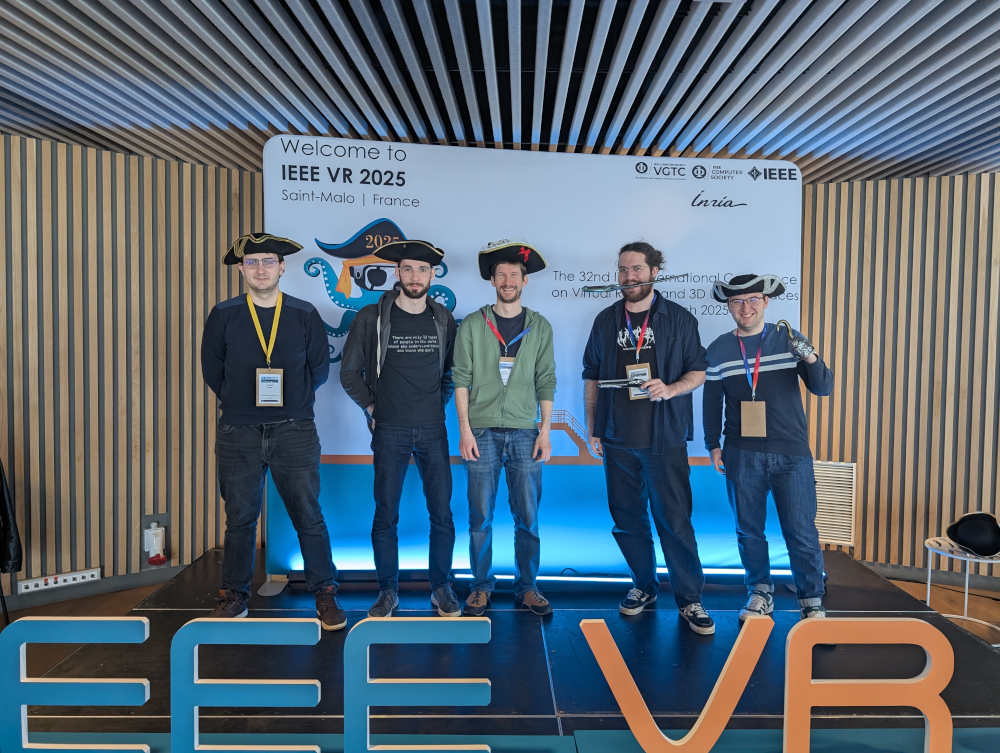MINT @ ICAT-EGVE 2025
Esther Gruy presented her paper Exploring the Use of Auditory Feedback as a Guide for 3D Drawing in Extended Reality at ICAT-EGVE. The paper is available here.

The MINT team conducts research in Human-Computer Interaction on the notion of extended interactions in observed situations, covering contexts such as interfaces in public spaces, artistic performances, teaching, but also rehabilitation (e.g., a practitioner observing a patient) or collaboration in general. More specifically, we focus on three main goals:
Esther Gruy presented her paper Exploring the Use of Auditory Feedback as a Guide for 3D Drawing in Extended Reality at ICAT-EGVE. The paper is available here.
Pierrick Uro successfully defended his PhD thesis titled Interaction, Space and Copresence in Colocated Mixed Reality .
Congratulations !!
Three new members just joined the team !
Nathan Salin will present his paper Toward Multimodal Asynchronous Collaboration in VR Artistic Creation with SPARK at ACM VRST in November. The paper is available here.
Yosra Rekik joins the team as associate professor !
Pierrick Uro will present his paper Strategies for the Reconciliation of Artistic Intent and Technical Constraints in Mixed Reality Performances at the ACM Conference on Designing Interactive Systems in July.
See https://dis.acm.org/2025/ for more informaion.
Florent Berthaut will present the paper GdPd / Ivmi-Builder : A Libre Software Framework for Extended Reality Musical Instruments and Immersive Sonic Installations at the Linux Audio Conference in June.
See https://jimlac25.inria.fr/lac/ for more informaion.
Pierrick Uro will present his paper Decoupling Physical and Virtual Spaces for New Collaboration Strategies in Co-Located Mixed Reality Instruments at the International Conference on New Interfaces for Musical Expression in June.
See https://nime2025.org/ for more information.

The team presented three projects at the IEEE VR Conference in March in Saint-Malo :
"Examining the Design Process for 3D Interactions in Performing Arts : A Spatial Augmented Reality Cyber-Opera Case Study" (Cagan Arslan, Florent Berthaut) can be accessed here
"Behavioral Measures of Copresence in Co-located Mixed Reality" (Pierrick Uro, Florent Berthaut, Thomas Pietrzak, Marcelo Wanderley), it can be accessed here
the artistic installation "Reverberations" (Sebastien Beaumont, Florent Berthaut). Here is the video :
The team will present three projects at the IEEE VR Conference in March in Saint-Malo :
the paper "Examining the Design Process for 3D Interactions in Performing Arts : A Spatial Augmented Reality Cyber-Opera Case Study" (Cagan Arslan, Florent Berthaut)
the paper "Behavioral Measures of Copresence in Co-located Mixed Reality" (Pierrick Uro, Florent Berthaut, Thomas Pietrzak, Marcelo Wanderley)
the artistic installation "Reverberations" (Sebastien Beaumont, Florent Berthaut)
Two PhD students joined the team, in co-supervision with Valérie Gouranton and Ronan Gaugne @ IRISA, Rennes, and fully or partially funded by the PEPR eNSEMBLE :
Guillaume Vallet will investigate immersive participatory artistic performances, looking at new metaphors for collaboration between artists and audience members in virtual environments.
Nathan Salin will work on co-creation in virtual environments between different modalities (music, dance, visual art ...)
Esther Gruy will present a review paper on 2D and 3D Musical Drawing at the ACM AudioMostly Conference in Milan in September.
Esther Gruy presented a paper on a new approach and device for musical drawing in extended reality with a physical interaction loop at the NIME conference.
Here is the video :
and here is the paper
Esther Gruy will present a paper on a novel device for musical drawing in extended reality at the NIME conference in Utrecht in September.
More details soon ...
Two PhD students joined the team !
Esther Gruy will work on novel devices and techniques for expressive 3D interaction, in particular 3D musical drawing.
Martin Birlouez will work on semi-private proxemic interaction for co-located collaboration.
A collaboration with Detjon Brahimaj and colleagues of the L2EP was presented as a paper at the French national conference on Human Computer Interaction : IHM 2023.
A performance of the project Vibrating Shapes in collaboration with Sebastien Beaumont and Ivann Cruz, was selected to be presented at the Conference on New Interfaces for Musical Expression 2023.
It can be watched on this page !
Three artistic projects that use the revealed augmented reality technology created by the team :
The team will be presenting two papers at the International Conference on New Interfaces for Musical Expression :
More details soon !
The "revealed" augmented reality technology designed by the team (presented here and here ) will be used in the cyber-opera "Terres Rares" created by Éolie Songe.
It will premiere in Grenoble on April 5th.
More information on the collaboration here.
Vincent Reynaert successfully defended his PhD on the "Study of Arm Fatigability during Mid-Air Gestual Interactions In Virtual Reality"
Congratulations Vincent !
Vincent Reynaert will be presenting a paper entitled The Effect of Rhythm in Mid-air Gestures on the User Experience in Virtual Reality at INTERACT 2021.
Vincent Reynaert and Florent Berthaut presented papers at the International Conference on New Interfaces for Musical Expression (NIME 2021).
The Effect of Control-Display Ratio on User Experience in Immersive Virtual Musical Instruments (Read the paper)
Musical Exploration of Volumetric Textures in Mixed and Virtual Reality (Read the paper)
Fatma Ben Guefrech presented the paper on "Revealable Volume Displays" at IEEE Virtual Reality and 3D User Interfaces. The paper also received a honorable mention.
And here is the supporting video
The team will be presenting two papers at the International Conference on New Interfaces for Musical Expression :
More details soon !
The team will be presenting a paper at IEEE Virtual Reality and 3D User Interfaces 2021 entitled : "Reveable Volume Displays : 3D Exploration of Mixed-Reality Public Exhibitions. More details soon !